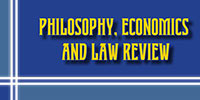
REVIEW PROCEDURE FOR MANUSCRIPTS
of scientific journal
«Philosophy, Economics and Law Review»
All articles submitted to the editorial board are subject to peer-review. The editors have determined the following order for reviewing manuscripts:
1. The author submits an article, which meets requirements of the journal «Philosophy, Economics and Law Review» and rules towards publishing articles, to the editorial board. Manuscripts that do not meet the accepted requirements are not registered and not allowed for further consideration with further notification of their authors.
2. Each article submitted to the editorial board passes two levels of a “blind” review (scientific examination) by research profiles: internal and external.
3. Editor-in-Chief of the relevant research profile of the journal’s section “Philosophy, Economics and Law Review” conducts the review and appoints reviewers. By the decision of the journal Editor-in-Chief (under certain circumstances), appointment of reviewers may be entrusted to a member of the editorial board.
In some cases, the issue of selecting reviewers can be resolved at the editorial board meeting. By the decision of the journal Editor-in-Chief (according to the recommendations of the executive editors), particular articles of distinguished scholars as well as authors specially invited by the editors to write an article, may be exempted from the standard review procedure.
4. Internal reviewers of manuscripts may be members of the editorial board of the scientific journal “Philosophy, Economics and Law Review”. External reviewers can be third-party highly qualified specialists with high level of professional knowledge and expertise in specific professional fields (usually Doctors of Science/PhD, professors).
5. An internal review is to be performed within one month upon the manuscript registration by the editorial board. In case of a positive response from an internal reviewer, a copy of the manuscript is sent for “blind” review by leading experts in the relevant field. Upon the consent of a “blind” reviewer to review materials (based on the appropriate qualification of the author’s research direction and the absence of any conflict of interest), he/she conducts a scientific examination of the article, usually within 90 days. The terms of reviewing can be changed in each case taking into account creating conditions for the most objective assessment of the submitted materials quality.
6. Interaction between an author, reviewers and the executive secretary of a certain section of the journal “Philosophy, Economics and Law Review” is performed via e-mail.
7. If a reviewer finds it necessary to make certain amendments in the article:
– the article is sent back to an author with a proposal to take into account the comments while updating the article or to reject them giving his/her arguments. The author adds a message to the revised article with response to all the comments and explanation of all the changes made.
The amended version is re-submitted to a reviewer for decision-making and preparation of a reasoned opinion on the possibility of publication. The date of acceptance of the article for publication is the date of a positive opinion of a reviewer (or the decision of the editorial board) on the feasibility of publishing the article.
8. An author of the manuscript has the right to provide a reasoned answer to journal editors in case of disagreement with the opinion of a reviewer. In such circumstances, the article is considered at the editorial board meeting. The editorial board may send the article for additional review to another specialist.
The editorial board reserves the right to reject an article in case of inability or unwillingness of an author to take into account recommendations and comments of reviewers.
9. After receiving a positive review, the manuscript is sent for literary and technical editing.
10. The final decision on the possibility and expediency of publication is made by the Editor-in-Chief in accordance with recommendations of the Executive Secretary of the journal. After making a decision on admission of the article to publication, the Executive Secretary of the journal informs an author and indicates expected date of publication.
Recommendation to publish the next issue of the journal (with an indication of the content) is made by the Academic Council of Dnipropetrovsk State University of Internal Affairs and stated in the relevant protocol.
